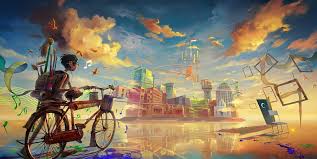
A large ocean liner leaves from its port in Istanbul, going to dock its cargo in Croatia. The large hull of cargo is held in the lower decks, while the upper decks are empty, aside from a few passenger compartments for the Captain and his crew. While sailing off the coast of Greece, a storm starts to move in from the south. The waves batter the ship, tossing it side to side. The cargo inside is beaten down, smashing pianos and furniture into thousands of pieces of ornate wood chips. The waves are high enough to wash up onto the deck and rush past the ship crew. One compartment can't stand the pressure of the waves and caves in, sending water rushing inside. The pieces of cargo that remain are sent out to sea, constantly bashed and beaten by waves. An alarm sounds in the ship, and the captain has the twenty ton compartment doors close off, allowing the ship to stabilize. The waves continue all night, not strong enough to break the hull again, but too strong to control the direction of the ship. A mayday signal is sent out, but the navigation isn't working, and no signal is found, leaving the crew by themselves.
The next morning, the ship has made it far off course. The navigation system is up again, and shows the ship cruising off the Italian coast. The ship is back in control, yet can't seem to escape a pull towards land. Unknown to the crew, the storm hit Italy as well, and has caused flooding. The hollow land around the coast isn't able to support the water, and has caved in, sending millions of gallons of water rushing to fill the space. The ship is locked in an inescapable tug, and is sent rushing through the water between the outer islands. In the distance, a city appears to float on water. The ship is no longer being pulled into the sink hole, but the momentum that has built is too great, and the ship refuses to stop, and is moving towards a canal. The Captain tries to divert the ship the best he can, but even with her mighty engines in reverse, the ocean liner was pulled further and further into the canal. It hits hard, the bow of the ship crashes head on into a small bridge, and takes out a building next to a small market stand. The force of the crash pushes a wave of water through the canals and sends the gondolas flying into the streets. It finally stops, parked at the intersection of a damaged chapel, and sunken houses.
The people of Venice step out of their houses to a grim sight. The beautiful city they've always known -the sight of hundreds of years of history, is gone in an instant. The rattled crew make their way outside to the city below. A damaged ship, an eyesore on what was one of the most beautiful cities in the world, lies before everyone. After a few weeks, it's found that the ship can't be removed, it has ruined the foundation for half the city, and if moved, will send the centuries old houses, shops and churches into the ocean. Over the years, the people have reluctantly grown fond of this boat, fixing it up, and decorating it to fit in with the look of the city. They know, whether they like it or not, this ship is the only think keeping this city alive.







